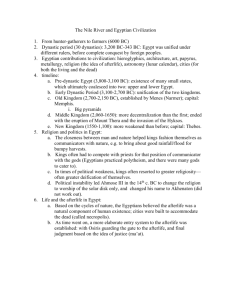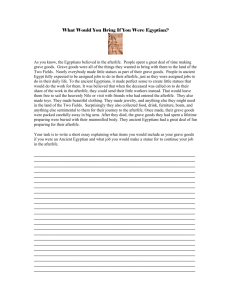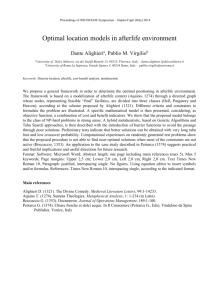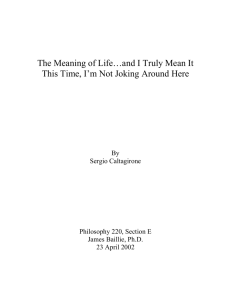Read more about this poll
advertisement
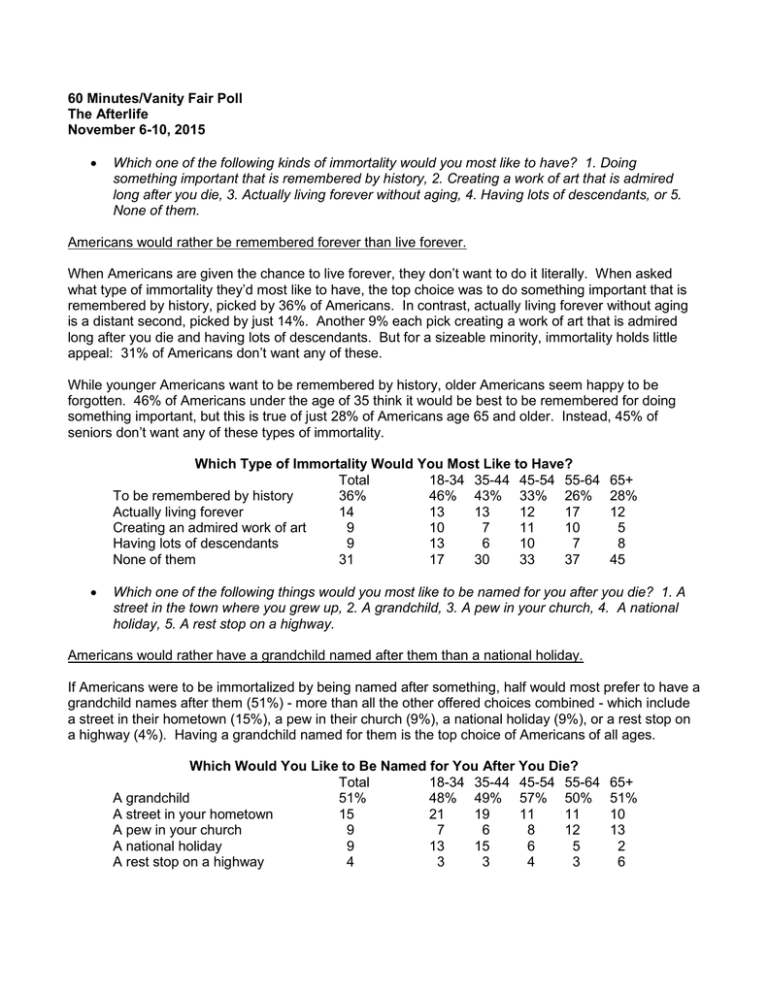
60 Minutes/Vanity Fair Poll The Afterlife November 6-10, 2015 Which one of the following kinds of immortality would you most like to have? 1. Doing something important that is remembered by history, 2. Creating a work of art that is admired long after you die, 3. Actually living forever without aging, 4. Having lots of descendants, or 5. None of them. Americans would rather be remembered forever than live forever. When Americans are given the chance to live forever, they don’t want to do it literally. When asked what type of immortality they’d most like to have, the top choice was to do something important that is remembered by history, picked by 36% of Americans. In contrast, actually living forever without aging is a distant second, picked by just 14%. Another 9% each pick creating a work of art that is admired long after you die and having lots of descendants. But for a sizeable minority, immortality holds little appeal: 31% of Americans don’t want any of these. While younger Americans want to be remembered by history, older Americans seem happy to be forgotten. 46% of Americans under the age of 35 think it would be best to be remembered for doing something important, but this is true of just 28% of Americans age 65 and older. Instead, 45% of seniors don’t want any of these types of immortality. Which Type of Immortality Would You Most Like to Have? Total 18-34 35-44 45-54 55-64 To be remembered by history 36% 46% 43% 33% 26% Actually living forever 14 13 13 12 17 Creating an admired work of art 9 10 7 11 10 Having lots of descendants 9 13 6 10 7 None of them 31 17 30 33 37 65+ 28% 12 5 8 45 Which one of the following things would you most like to be named for you after you die? 1. A street in the town where you grew up, 2. A grandchild, 3. A pew in your church, 4. A national holiday, 5. A rest stop on a highway. Americans would rather have a grandchild named after them than a national holiday. If Americans were to be immortalized by being named after something, half would most prefer to have a grandchild names after them (51%) - more than all the other offered choices combined - which include a street in their hometown (15%), a pew in their church (9%), a national holiday (9%), or a rest stop on a highway (4%). Having a grandchild named for them is the top choice of Americans of all ages. Which Would You Like to Be Named for You After You Die? Total 18-34 35-44 45-54 55-64 A grandchild 51% 48% 49% 57% 50% A street in your hometown 15 21 19 11 11 A pew in your church 9 7 6 8 12 A national holiday 9 13 15 6 5 A rest stop on a highway 4 3 3 4 3 65+ 51% 10 13 2 6 Which one of the following people do you think would be most surprised at how they are remembered by later generations? Men think Shakespeare would be most surprised at how he is remembered, women pick Marilyn Monroe. For those who do attain immortality through fame, it may not be how they expect to be remembered - if they expect to be remembered at all. When asked who would be most surprised at how they are remembered by later generations, Americans are torn between Marilyn Monroe (21%) and William Shakespeare (21%) as their top choice – with men leaning towards Shakespeare (22%) and women leaning towards Monroe (23%). Further down on the list are post-impressionist painter Vincent Van Gogh (18%), Founding Father and revolutionary Samuel Adams (12%), Egyptian Queen Cleopatra (11%), and reclusive poet Emily Dickinson (8%). Who Would Be Most Surprised at How They Are Remembered? Total Men Women Marilyn Monroe 21% 18% 23% William Shakespeare 21 22 20 Vincent Van Gogh 18 19 18 Samuel Adams 12 17 7 Cleopatra 11 10 11 Emily Dickinson 8 4 11 Which one of the following movies is most likely to still be a cult classic a hundred years from now? Many Americans think people could still be doing “The Time Warp” 100 years from now. If Americans could guess what movie would still be considered a cult classic in 100 years, The Rocky Horror Picture Show is the top choice, picked by 20% of Americans from a list of seven “cult” movies. Tied for second place are Monty Python and the Holy Grail (16%) and Quentin Tarantino’s Pulp Fiction (16%), followed by The Princess Bride (13%). In just single digits are The Big Lebowski (6%), The Room (2%), and Pee Wee’s Big Adventure (2%). 14% volunteer that they don’t know any of these movies. While Rocky Horror is the top choice of older Americans – particularly between the ages of 45 and 54 – Americans between 18-34 favor Pulp Fiction as the movie that will still stand as a cult classic 100 years from now. Which Movie Will Still Be a Cult Classic in 100 Years? Total 18-34 35-44 45-54 The Rocky Horror Picture Show 20% 15% 19% 33% Monty Python and the Holy Grail 16 14 17 15 Pulp Fiction 16 23 18 15 The Princess Bride 13 15 16 13 The Big Lebowski 6 10 2 6 The Room 2 1 3 2 Pee Wee’s Big Adventure 2 5 1 * Don’t know any of these (vol.) 14 12 12 11 55-64 24% 19 13 11 6 2 2 11 65+ 16% 15 8 9 3 4 1 25 2 Which are you better prepared for – retirement or death? Lower income Americans are better prepared for death than retirement. Americans are divided between death and retirement as to which they are more prepared for. 43% of Americans say they are better prepared for death, while 41% are better prepared for retirement. The split falls along economic lines. Among those earning under $50,000 a year, Americans are better prepared for death (49%) than retirement (35%), while those earning $100,000 a year are better prepared for retirement (54%) than death (32%). Death Retirement Which Are You Better Prepared For? Total <$50K $50K-$100K 43% 49% 42% 41 35 43 $100K+ 32% 54 If you had to choose, which question would you rather know the answer to – “What happens after you die?” or “What is the meaning of life?” Learn the meaning of life or find out what comes after it? Americans are also torn between wanting to know the meaning of life or finding out what happens after you die: 45% pick the former and 48% pick the latter. This divide can be seen along most demographic groups, though Americans who identify with a religious faith are slightly more likely to want to know what happens after death, while those who do not identify with a religion lean slightly towards finding out the meaning of life. Which Would You Rather Know the Answer To? Total Religious Not religious What happens after you die? 48% 49% 46% What is the meaning of life? 45 44 49 Do you think science could someday prove whether or not the afterlife exists, or do you think the existence of the afterlife will always be beyond the ability of science to prove? Most Americans doubt that science can prove whether the afterlife exists. For those who want to know what happens after they die, Americans have little confidence that science holds the answer. Just 30% of Americans think science could someday prove whether or not the afterlife exists, while 67% think this will always be beyond the ability of science to prove. Both religious and non-religious Americans are skeptical of science on this topic. Can Science Prove Whether the Afterlife Exists? Total Religious Not religious Yes 30% 27% 36% No 67 69 62 3 What do you think of people who have had a near death experience and report having seen loved ones, God, or heaven? 1. Most have had a real glimpse of the afterlife, 2. Most are delusional. Most Americans think near death experiences can be a glimpse into the afterlife. Most Americans think some people have seen evidence of the afterlife firsthand: those who report having had a near death experience. 63% of Americans think most people who have had a near death experience - and report having seen loved ones, God, or heaven - have had a real glimpse of the afterlife, while just 27% think most are just delusional. Religious Americans (67%) are more likely than the non-religious (52%) to think such people have really seen the afterlife, though majorities of both groups think this is so. Views of People Who Have Had a Near Death Experience Total Religious Not religious Most have seen the afterlife 63% 67% 52% Most are delusional 27 24 39 Where would you send someone who is trying to find the best picture of what life after death might look like? Americans would go to a religious figure to find out about life after death. If you wanted to find out what life after death might look like, most Americans (61%) would send you to a religious figure to find out - at least before they’d send you to the movies (14%), a high school science teacher (7%), or a New Yorker cartoon (5%). Americans who identify with a specific religion overwhelmingly choose a religious figure to consult with on what the afterlife looks like (70%), while Americans who are not religious are not so sure. While 33% of Americans who do not identify with a religion would pick a religious figure, almost as many would recommend going to the movies (27%). Where Should Someone Look for the Best Picture of What Life After Death Looks Like? Total Religious Not religious A religious figure 61% 70% 33% The movies 14 11 27 A high school science teacher 7 5 14 A New Yorker cartoon 5 4 10 None of these (vol.) 8 7 12 4 If you could be reincarnated after you die and have a new life as any one of the following, which would you choose? One in thee Americans pick to be reincarnated as a grandchild over being reincarnated as dog, a prince or princess, or a famous recluse. If the afterlife means being reincarnated, a third of Americans would choose being reincarnated as their own grandchild, over a dog, royalty, or a brilliant recluse. 34% of Americans pick coming back as their own grandchild, ahead of the second choice pick – being reincarnated as a healthy dog with loving owners (25%) - though more Americans choose walking on four legs and living in dog years than being reborn into royalty as a prince or princess of a small but peaceful country (20%). Just 8% of Americans would want to be a brilliant recluse who only became famous after death. Which Would You Choose to Be Reincarnated As? Total Men Your own grandchild 34% 31% A health dog with loving owners 25 27 A prince/princess of a small peaceful country 20 22 A brilliant recluse who becomes famous only after death 8 10 Women 36% 24 19 6 Which one of the following former public officials has had the best life after holding office? 1. Sarah Palin as a political commentator, 2. Al Gore as a documentary filmmaker and activist, 3. Jimmy Carter as a humanitarian, or 4. George W. Bush as a painter. Republicans and Democrats agree – Jimmy Carter has had the best life after holding office. When it comes to life after holding political office, Americans think Jimmy Carter has had the best “afterlife”, at least compared to some other public officials who have retired after him. The former president – who was awarded the Nobel Peace Prize for his humanitarian work in his post-White House years – is chosen by 55% of Americans as having the best life after public office, and he is the top choice of Democrats (65%), independents (52%), and even Republicans (46%). In distant second place is another former president - George W. Bush - picked by just 18% of Americans for his second career as a painter since leaving office in 2009. Former Vice President Al Gore gets 11% for his work as a documentary filmmaker and activist after he lost the 2000 presidential election to Bush, while one-time Vice Presidential candidate and former Alaskan governor Sarah Palin is last with just 8% for her post-office career as a political commentator. Jimmy Carter George W. Bush Al Gore Sarah Palin Who Has Had the Best Life After Holding Public Office? Total Republicans Democrats Independents 55% 46% 65% 52% 18 24 9 21 11 7 15 10 8 17 4 7 5 __________________________________________________________________________________ This poll was conducted by telephone from November 6-10 among a random sample of 1,010 adults nationwide. Data collection was conducted on behalf of CBS News by SSRS of Media, PA. Phone numbers were dialed from samples of both standard land-line and cell phones. The poll employed a random digit dial methodology. For the landline sample, a respondent was randomly selected from all adults in the household. For the cell sample, interviews were conducted with the person who answered the phone. Interviews were conducted in English and Spanish using live interviewers. The data have been weighted to reflect U.S. Census figures on demographic variables. The error due to sampling for results based on the entire sample could be plus or minus four percentage points. The error for subgroups may be higher and is available by request. The margin of error includes the effects of standard weighting procedures which enlarge sampling error slightly. This poll release conforms to the Standards of Disclosure of the National Council on Public Polls. 6 60 Minutes/Vanity Fair Poll The Afterlife November 6-10, 2015 VF-01. Which one of the following kinds of immortality would you most like to have? Doing something important that is remembered by history Actually living forever without aging Creating a work of art that is admired long after you die Having lots of descendants None of them Don’t Know/Refused *********** TOTAL RESPONDENTS ********** ************** Age ************** Total 18-34 35-44 45-54 55-64 65+ % % % % % % 36 46 43 33 26 28 14 13 13 12 17 12 9 10 7 11 10 5 9 13 6 10 7 8 31 17 30 33 37 45 2 2 2 2 3 2 VF-02. Which one of the following things would you most like to be named for you after you die? A grandchild A street in the town where you grew up A pew in your church A national holiday A rest stop on a highway None of these (vol.) Don’t Know/Refused 51 15 9 9 4 11 1 48 21 7 13 3 6 1 49 19 6 15 3 6 2 57 11 8 6 4 11 2 50 11 12 5 3 19 * 51 10 13 2 6 17 3 *Less than 0.5% VF-03. Which one of the following people do you think would be most surprised at how they are remembered by later generations? Marilyn Monroe William Shakespeare Vincent Van Gogh Samuel Adams Cleopatra Emily Dickinson Don’t Know/Refused Total % 21 21 18 12 11 8 9 Men % 18 22 19 17 10 4 9 Women % 23 20 18 7 11 11 9 VF-04. Which one of the following movies is most likely to still be a cult classic a hundred years from now? The Rocky Horror Picture Show Monty Python and the Holy Grail Pulp Fiction The Princess Bride The Big Lebowski The Room Pee Wee’s Big Adventure Not familiar with any of these movies (vol.) Don’t Know/Refused Total % 20 16 16 13 6 2 2 14 9 ************** Age ************** 18-34 35-44 45-54 55-64 65+ % % % % % 15 19 33 24 16 14 17 15 19 15 23 18 15 13 8 15 16 13 11 9 10 2 6 6 3 1 3 2 2 4 5 1 * 2 1 12 12 11 11 25 3 13 4 11 19 VF-05. Which are you better prepared for – retirement or death? Death Retirement Both Equally (vol.) Neither (vol.) Don’t Know/Refused ******** TOTAL RESPONDENTS ******* ********** Income ********** Total <$50K $50K-$100K $100K+ % % % % 43 49 42 32 41 35 43 54 5 4 6 5 10 10 8 9 1 2 1 * *Less than 0.5% VF-06. If you had to choose, which question would you rather know the answer to? What happens after you die? What is the meaning of life? Don’t Know/Refused Total % 48 45 7 Religious % 49 44 7 Not religious % 46 49 5 VF-07. Do you think science could someday prove whether or not the afterlife exists, or do you think the existence of the afterlife will always be beyond the ability of science to prove? Yes, science can prove afterlife No, science cannot prove afterlife Don’t Know/Refused 30 67 4 27 69 4 36 62 1 VF-08. What do you think of people who have had a near death experience and report having seen loved ones, God, or Heaven? Most have had a real glimpse of the afterlife Most are delusional Depends (vol.) Don’t Know/Refused 63 27 2 8 67 24 2 7 52 39 2 7 VF-09. Where would you send someone who is trying to find the best picture of what life after death might look like? A New Yorker cartoon A religious figure A high school science teacher The movies None of these (vol.) Don’t Know/Refused 5 61 7 14 8 4 4 70 5 11 7 3 10 33 14 27 12 4 VF-10. If you could be reincarnated after you die and have a new life as any one of the following, which would you choose? Your own grandchild A healthy dog with loving owners A prince or princess of a small peaceful country A brilliant recluse who becomes famous only after death Don’t Know/Refused Total % 34 25 20 8 13 Men % 31 27 22 10 11 Women % 36 24 19 6 15 8 VF-11. Which one of the following former public officials has had the best life after holding office? Jimmy Carter as a humanitarian George W. Bush as a painter Al Gore as a documentary filmmaker and activist Sarah Palin as a political commentator Don’t Know/Refused Total respondents: *** TOTAL RESPONDENTS *** ***** Party ID ***** Total Reps Dems Inds % % % % 55 46 65 52 18 24 9 21 11 7 15 10 8 17 4 7 8 6 7 10 1,010 9


